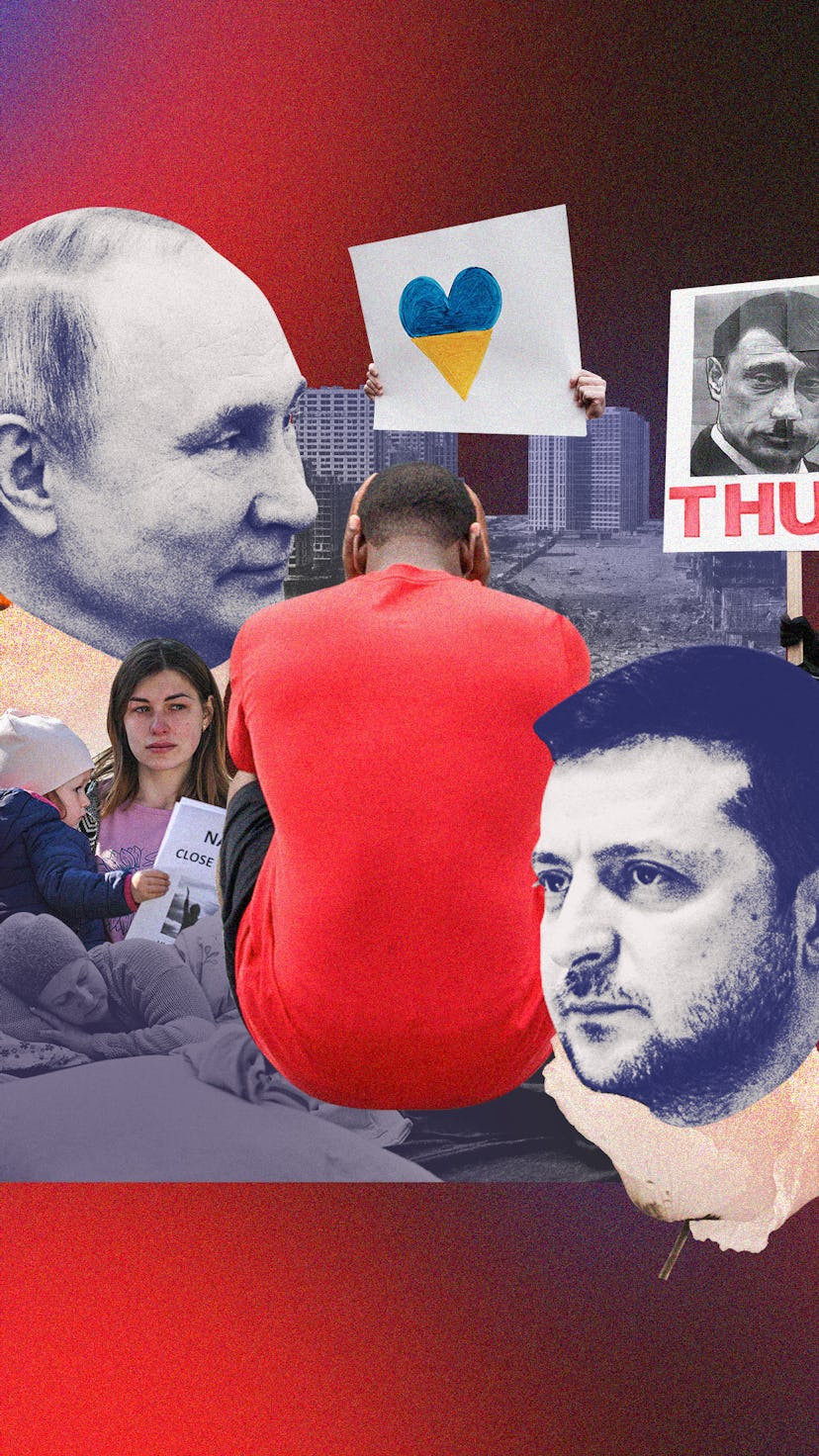How to process the reality of war, even when it’s far away
Psychologists tell us how to stay engaged without letting anxiety take over.

Watching the news cycle from Ukraine these past several weeks has been terrifying. The violence is far away from me, geographically speaking, but it feels very close. None of us want to see people suffering at the hands of a maniac, and it can feel hard to have a normal day when you’re constantly pondering the injustice of it all.
Processing the reality of the war involves quelling your anxiety while staying engaged. “Start with an overall assessment of the risks and implications of the war for you, your loved ones, and your communities,” says Lydiana Garcia, a psychotherapist in Los Angeles. If you live in America, Putin is not posing an imminent danger to your life or liberty, even though there may be socioeconomic implications at play.
If you and your immediate community are safe (this is the case for most of us here in the States), it’s time to gather your emotional resources. Assess your feelings. You can write them down, make a voice memo, call a friend, or just say them out loud, but however you choose to take emotional stock of the moment, take the time and space to be present to the experience.
“It's helpful to process the reality of war while making sure we are grounded in the present moment,” says Max Maisel, a Los Angeles-based psychologist. “This can include noticing your feet pushed against the floor as you are talking, or taking a few slow, long breaths during the conversation, feeling the rising and falling of your chest and abdomen with each breath,” says Maisel. The anxiety around the violence you’re seeing on your timeline is very real, and you can only help in any way if you’re feeling grounded.
Try not to make judgements about your emotions. “There are no ‘wrong feelings’ to have,” says Maisel. There are, however, healthy and unhealthy ways to process those feelings, he explains. “Healthy ways include having conversations about your thoughts and feelings with trusted loved ones, allowing yourself to feel a wide range of mixed and complex emotions — such as having compassion and sadness for victims of war, anger at the aggressors, and gratitude if you yourself are currently safe,” Maisel says.
Unfortunately, if you’re like me and many of the people I know, what you’re mostly feeling is hopeless and helpless. Maisel and Garcia agree that those feelings are natural, but really uncomfortable, and that often when we are feeling any kind of powerless, the first thing we do is judge ourselves for it. That only makes us feel worse and more stuck, and it’s also counterproductive.
“We should strive to treat ourselves as we would a dear friend or family member,” says Maisel. That means talking to ourselves nicely, redirecting our attention away from negative feedback loops and trying to find ways that we can feel a sense of agency and hope. “In a crisis, there are often lots of people that step up and use their skills to help others,” says Garcia. “Redirecting our attention to them, can provide us with a more balanced view and decrease the feelings of hopelessness.” This is classic Mr. Rogers wisdom and I am here for it: Look for the helpers.
The next step in recovering a sense of agency is figuring out what you can do to help. “Doing something about it can provide a sense of purpose, power and that you are helpful, and could potentially help you feel more hopeful,” Garcia says. If you are lost about what you can possibly do, think about what resources you have. If you have money, you can donate to a Ukrainian aid organization or a mutual aid that’s doing work on the ground. Some people have the means to physically volunteer. If you don’t have the resources to give your time or money, that’s okay. What you can do is stay educated and help educate others.
You probably already know that staying educated doesn’t equate to staying locked in to the news cycle 24-7. “It can be helpful to watch news more intentionally,” says Maisel. That means instead idley scrolling, before you check in on the news, ask yourself why you’re checking, notice how it makes you feel when you do it, and notice how you feel afterwards. Personally, I am trying to spend more time reading the accounts of individuals in Ukraine rather than freebasing Big News because it makes me feel more connected. However you choose to engage, Maisel and Garcia agree, do it in a way that ensures that you are staying tapped into reality without tapping yourself out.